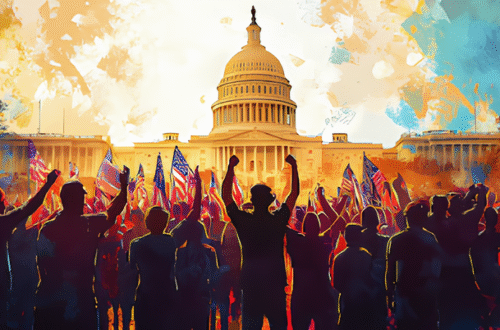Introduction: The Illusion of Power
In contemporary society, the realm of politics often presents a facade designed to captivate public attention while obscuring the deeper currents of influence that truly govern decision-making processes. This phenomenon, referred to as the illusion of power, raises pertinent questions about the nature of authority and control in the political landscape. While dramatic speeches and media appearances may spotlight elected officials, it is crucial to examine the forces operating behind the scenes, the so-called puppeteers who shape policies and steer political narratives.
The political arena is frequently characterized by an array of competing interests, including lobbyists, corporate entities, and influential interest groups, all of whom play significant roles in steering political agendas. These actors operate in a complex web of relationships, often blurring the lines between public service and private ambition. As a result, the individuals at the forefront, such as governors, senators, or presidents, might appear to wield substantial power. However, their actions and decisions are frequently dictated by the interests of those who truly hold sway. This relationship can create an environment where elected officials are perceived as mere figureheads, with their autonomy significantly constrained by external pressures and predetermined narratives.
The Puppet Master Dynamic
The metaphor of puppet mastery in politics serves as a provocative lens through which to examine the dynamics of power and influence in contemporary governance. In this context, visible leaders—often deemed the decision-makers—may function as mere front figures, while more powerful forces operate behind the scenes. This phenomenon raises critical questions about the authenticity of leadership and the true motivations driving policy decisions and public actions.
At the forefront of this discussion lies the idea of governance as a performance, with public figures skillfully managing their image to convey a semblance of control and agency. However, beneath this façade, intricate networks of lobbying, funding, and hidden interests often orchestrate the political landscape, making it essential to scrutinize the underlying forces at play. For instance, politicians may advocate for policies that appear beneficial on the surface yet are influenced by powerful socio-economic groups that prioritize their agendas over public welfare.
Moreover, this puppet master dynamic raises questions about the incentives that shape political behaviors. Elected officials are frequently motivated by the need to secure campaign financing, which can lead to compromises that disturb the integrity of their leadership. In many cases, the actions of these leaders may align more closely with the expectations and desires of their benefactors rather than the constituents they ostensibly serve. The perception of autonomy in decision-making may, therefore, be an illusion, hiding a more complex array of interactions and vested interests.
The intricate interplay between visible leadership and unseen influence prompts us to reconsider our assumptions about governmental authenticity. As citizens, recognizing these dynamics urges a more nuanced understanding of how policies are crafted and the forces that shape them. Understanding the puppet master dynamic in modern politics is essential for fostering critical discourse regarding authenticity in leadership and public accountability.
The Power Elite: Oligarchs and Influence
In contemporary politics, the significance of the power elite cannot be overstated. This group consists of a select few individuals, often billionaires and high-ranking corporate executives, who wield substantial influence over political processes. Their financial resources allow them to manipulate public policy and political decisions in ways that frequently evade widespread scrutiny. By providing substantial campaign contributions, these elite figures ensure their interests are prioritized in governmental agendas.
The phenomenon of “dark money” plays a critical role in this landscape. Dark money refers to the undisclosed sources of funding used to influence elections and legislation, often flowing from anonymous donors. This lack of transparency raises pressing questions about accountability and the integrity of the democratic process. The influence of oligarchs is further compounded by their ability to establish and finance lobbying groups, which advocate for specific policies aligned with their personal or corporate interests. These entities operate in a shadowy realm, often evading regulatory oversight, thereby consolidating power among a limited few.
Institutional privileges also enhance the ability of the power elite to exert influence. Many of these individuals have established deep connections with political leaders and regulators, creating a network of power that is difficult to penetrate. Through this nexus, they can shape legislation, sway public opinion, and impact elections, all while maintaining a facade of legitimacy. As a result, a growing disconnect emerges between the interests of the general public and those of the elite, culminating in policymaking that caters to the preferences of a minute fraction of the population.
Ultimately, understanding the dynamics of the power elite is essential for comprehending modern political landscapes. The complex interplay of wealth, influence, and institutional privilege lays bare the realities of governance in an era increasingly marked by oligarchic tendencies, thereby necessitating critical examination and dialogue about the future of democracy.
Shadow Governance: The Unseen Machinery of Power
In contemporary political discourse, the term “shadow governance” possesses significant relevance. It refers to the intricate web of entities, individuals, and organizations that operate outside the conventional parameters of elected office and official bureaucratic structures, significantly influencing policy and public opinion. These mechanisms of unseen power contribute to shaping the political landscape, often without public awareness or accountability.
Think tanks, for instance, are a crucial component of shadow governance. These organizations conduct research, develop policy proposals, and engage in advocacy on various issues. Funded by a mix of private donations, government grants, and corporate sponsorships, think tanks serve as an intellectual backbone for shaping governmental agendas. Their output can significantly mold public discourse, providing ideological frameworks that align with certain interests while often remaining cloaked in the guise of expert analysis.
Additionally, advisory boards are another facet of shadow governance. Comprising experts from diverse fields, these boards advise politicians and other leaders, transmitting specialized knowledge into the policymaking process. However, while these advisory bodies can elevate discourse, they inherently function outside the electorate’s control, leading to questions regarding their accountability and influence in shaping governance outcomes. This lack of transparency raises concerns about whose interests are prioritized in the decision-making process.
Moreover, power brokers operate within this shadowy realm, wielding considerable influence without holding formal positions of authority. These individuals often leverage their connections, resources, and knowledge to advocate for particular policies or business interests, impacting legislation in profound ways. While they may remain hidden from public view, their impact is undeniable, effectively orchestrating outcomes in various spheres, from local governance to international relations.
The interplay of these elements illustrates that modern governance is not merely a product of visible political structures but is also deeply affected by powerful entities operating in the shadows, underscoring the complexities within contemporary political dynamics.
Media Manipulation: The Role of Information Control
In the contemporary political landscape, media serves as a pivotal instrument for shaping public perceptions and narratives. The information disseminated through various media channels not only informs citizens but also influences their opinions and behaviors regarding political issues. Understanding the mechanisms of media manipulation is essential for comprehending the intricate relationship between media ownership patterns, bias, and political power dynamics.
The ownership of media outlets plays a central role in determining the perspectives presented to the public. When a small number of corporations dominate media ownership, there is a risk of skewed reporting that favors specific political ideologies or agendas. This concentration of power can lead to a homogenization of viewpoints, restricting the diversity of opinions available to the public. Consequently, citizens may find themselves exposed primarily to narratives that align with the interests of these corporate owners, hampering critical discourse.
Furthermore, media bias is often evident in the framing of news stories, which can slant public perception about individuals, policies, or events. By selectively highlighting certain aspects while downplaying or omitting others, media outlets can create a narrative that shapes audience interpretation. This manipulation is not limited to news reporting; it extends to editorial choices, advertisements, and even the portrayal of political figures. Such bias can exacerbate polarization within society, as individuals increasingly consume media that reinforces their pre-existing beliefs.
The interplay between media control and political influence is profound. Politicians and political groups often attempt to leverage media to project their desired image, sway public opinion, and ultimately secure power. As citizens become more aware of the intricacies of media manipulation, it is crucial to foster a culture of media literacy that empowers individuals to critically evaluate the information they encounter. The ability to discern bias and question narratives is fundamental in navigating the complexities of modern politics, ensuring that diverse voices and perspectives are not drowned out by the puppeteers of information control.
Public Distraction: The Role of Red Herring Politicking
In contemporary politics, red herring politicking has emerged as a pivotal strategy used to divert public attention from urgent systemic issues. Politicians and their communications teams often craft elaborate narratives or sensational stories that, while captivating, serve primarily to distract citizens from significant policy discussions or failures. This manipulation of public focus can obscure essential questions ranging from health care reform debates to income inequality and climate change.
For instance, media coverage frequently shifts dramatically in response to political scandals or controversial statements, drawing attention away from pressing legislative matters or detrimental socio-economic conditions. Such tactics can effectively engage the electorate’s emotions, leading to sensationalized debates that overshadow more profound and consequential dialogues. As a result, the public can find itself embroiled in distractive political dramas that may, on the surface, seem pertinent but ultimately detract from more critical inquiries that demand scrutiny.
Social media platforms amplify this effect by allowing rapid dissemination of information that lacks contextual depth. In a digital landscape dominated by clicks and shares, attention can easily be seized by flashy headlines or inflammatory commentary rather than substantial discourse. Consequently, voters might become disengaged from meaningful concerns, believing that a particular hot-button issue represents the entirety of political discourse. This phenomenon explains why engagement with media, rather than fostering informed participation, sometimes hinders it.
A critical examination of the news cycle reveals that many of the most discussed topics are often the least relevant to the populace’s everyday challenges. As citizens, it is essential to cultivate a discerning media consumption habit, ensuring that the focus remains on issues that align with the broader societal context. By doing so, individuals can resist the allure of superficial distractions and engage thoughtfully with the underlying complexities of modern governance.
The Influence of Technology: Algorithms and Public Perception
In the contemporary political landscape, the interplay between technology and public perception is increasingly significant. Social media platforms have transformed the way information is disseminated, fundamentally altering political discourse. Algorithms, which dictate the content that users encounter, play a crucial role in shaping public opinion by curating personalized feeds that may reinforce existing biases or beliefs. Such algorithms prioritize engagement and often favor sensational or emotionally charged content, leading to polarized viewpoints among the electorate.
Politics has adapted to this digital environment, with political entities employing advanced data analytics to tailor their messages. Campaigns strategically utilize social media algorithms to target specific demographics, ensuring that their narratives reach and resonate with potential voters. This data-driven approach allows political actors to maximize their outreach and influence, manipulating the information that individuals are exposed to. Consequently, the role of algorithms becomes one of the most influential tools in modern politics, capable of swaying public sentiment and voter behavior.
Moreover, misinformation and disinformation have proliferated in this digital age, further complicating the political discourse. Social media algorithms can unintentionally promote false narratives, as engagement metrics determine the visibility of content. This has raised concerns about the integrity of democratic processes, as orchestrated campaigns can manipulate public perception through the strategic deployment of misleading information. The influence of technology on political dynamics reveals a complex relationship where digital platforms can act both as facilitators of democratic engagement and as battlegrounds for disinformation.
Ultimately, the intersection of technology and politics necessitates a critical evaluation of how algorithms shape political narratives. As voters navigate these digital landscapes, understanding the mechanics behind content curation can empower them to engage more thoughtfully in the democratic process. In a world where the strings of influence are often hidden, raising awareness about the role of technology in shaping public perception is crucial for fostering informed citizenry.
Case Studies: Historical Examples of Puppet Masters
Throughout history, there have been numerous instances where influential figures have manipulated political frameworks from behind the scenes, often referred to as ‘puppet masters.’ These case studies highlight the complex interplay of power and influence that defines political landscapes.
One prominent example is Niccolò Machiavelli’s concept of a ruler’s dependence on advisors, as exhibited during the reign of the Medici family in Renaissance Florence. The Medici, initially patrons of art and culture, gradually established themselves as political powerhouses. Lorenzo de’ Medici, known as Lorenzo the Magnificent, skillfully navigated the political arena, allowing him to maintain control while operating through a network of advisors and local elites who acted as his proxies. This example illustrates how a strategic approach to governance can create a façade of democratic leadership, while actual decision-making remains consolidated in the hands of a few.
Another pivotal case is that of the United States’ involvement in foreign affairs during the Cold War. The CIA’s clandestine operations, such as those in Iran and Guatemala during the 1950s, reveal a pattern of manipulation whereby elected leaders were either overthrown or replaced with more compliant figures. The U.S. government often justified these actions as necessary for national security, yet they serve as a stark reminder of how foreign policy can be influenced by covert agendas, effectively turning leaders into puppets when their decisions are dictated by external powers.
These historical instances underscore the longstanding presence of puppet masters in political scenarios. As we draw parallels to contemporary politics, the influence of powerful individuals or organizations continues to shape the governance of nations, impacting public policy and electoral outcomes. The ability to manipulate public opinion and control political agendas remains a critical component of modern governance, exemplifying the enduring relevance of such historical cases.
Conclusion: Seeking Transparency in a Complex Landscape
As we delve into the intricacies of modern politics, it becomes clear that transparency and accountability are essential in demystifying the often opaque dynamics that underpin governance. The actors that influence political landscapes wield significant power, leading to a subtle manipulation of public perception and policy formation. Therefore, advocating for a political system that emphasizes openness and encourages citizen participation is crucial in fostering a healthy democracy.
To combat manipulation, citizens must educate themselves about the intricacies of political processes and the various interests at play. This knowledge serves as a foundational tool in holding elected officials accountable, compelling them to act in the public’s best interest rather than in alignment with the covert agendas of unseen influencers. By endorsing transparency, individuals can encourage institutions to establish clearer lines of communication, ensuring that decision-makers operate with the public’s trust as a paramount concern.
Moreover, engaging with community groups or civic organizations can bolster collective understanding and advocacy efforts. Such coalitions help amplify voices that might otherwise go unheard, thereby enriching the dialogue surrounding accountability in governance. Additionally, leveraging social media platforms enables grassroots movements to garner support and mobilize citizens toward advocating meaningful change. By joining forces with like-minded individuals, the community can challenge the status quo and push for reforms that align with democratic ideals.
Ultimately, recognizing the forces at play in modern politics empowers individuals to be vigilant and proactive. In unmasking the puppeteers and questioning the motives behind their actions, society can navigate towards a future characterized by enhanced equity and transparency. This commitment to individual and collective responsibility is vital in shaping a political landscape that truly reflects the democratic values we hold dear.





